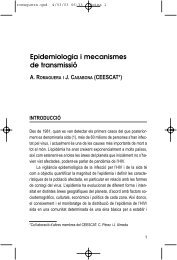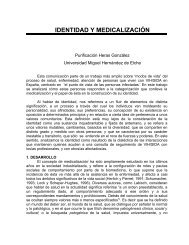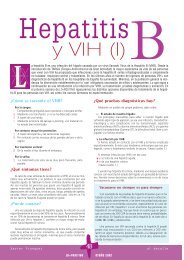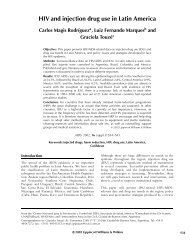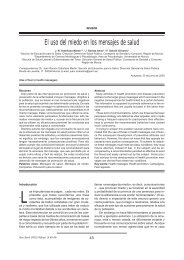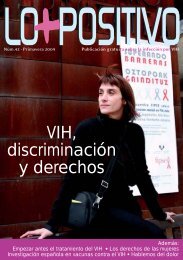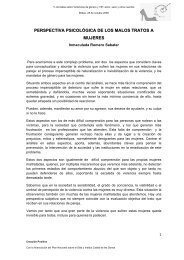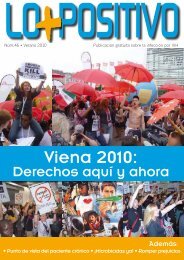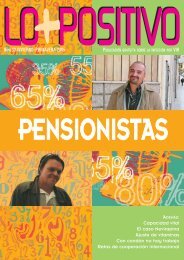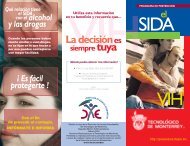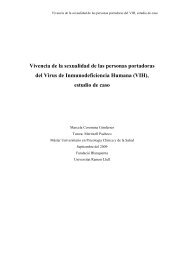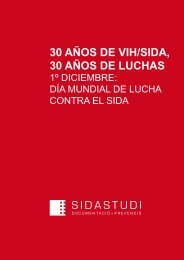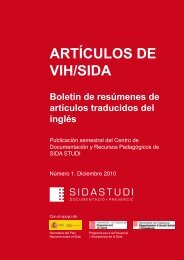Report - Sida Studi
Report - Sida Studi
Report - Sida Studi
Create successful ePaper yourself
Turn your PDF publications into a flip-book with our unique Google optimized e-Paper software.
Appendix 2: Workshop descriptions<br />
Friday, 30 September<br />
Overall theme: ‘Working with migrant youth<br />
and/or religious leaders’<br />
Skills building workshops<br />
1. Learning to work with religious or faith-based communities<br />
- and getting new tools to involve religious leaders<br />
Religious leaders can sometimes be key people in helping<br />
to reach a target population in a community with a<br />
strong basis in faith. How can we involve them in our<br />
work or continue to work together respectfully?<br />
2. Learning to talk about sex – and dealing with diversity,<br />
gender and intercultural communication issues<br />
Raising awareness about HIV/AIDS risks involves more<br />
open communication about sexuality. Issues such as<br />
cultural diversity, gender and sexual diversity all have an<br />
impact on what and how we enter into discussion about<br />
this. How can we become more effective communicators<br />
in the context of this diversity?<br />
3. Learning to inspire youth & adult collaboration – and<br />
improving youth & adult partnership<br />
Youth participation is often referred to as an important<br />
component in HIV/AIDS prevention interventions. What<br />
are the pitfalls and benefits of collaboration between<br />
young people and adults? How can we establish genuine<br />
partnerships rather than ending up involving young people<br />
in a tokenistic way?<br />
Capacity building workshops<br />
4. Capacity building for new leadership; how to identify<br />
possible collaboration partners?<br />
Many organisations strive to reach the same goal in HIV/<br />
AIDS prevention, each of them brining their own expertise<br />
to bear. How can we identify which organisation to<br />
approach to develop a productive collaboration; how can<br />
we make more use of existing or alternative networks?<br />
How can we empower migrant youth in leadership development?<br />
5. The challenge of involving boys and men in HIV/AIDS<br />
prevention – Is empowering them around their responsibilities<br />
part of the solution?<br />
Many HIV/AIDS prevention activities target women and/<br />
or involve more women than men. How can we approach<br />
male migrant populations to stimulate their direct<br />
involvement in sexual health issues and activities?<br />
6. Using creative ways in prevention activities<br />
Possibility to show audiovisual materials of performances,<br />
Education & Entertainment, testimonies and/or other<br />
creative ways of reaching communities with prevention<br />
activities.<br />
Saturday, 1 October<br />
Overall theme: ‘Working with migrant<br />
PWLHA and/or supporting access to care’<br />
Skills building workshops<br />
7. Learning to work with a community-based approach<br />
– and mobilising the community for prevention activities<br />
Communities have different traditions and systems. How<br />
can we develop activities in response to the needs of a<br />
community; working with them instead of for them?<br />
8. Learning to empower collaboration between PLWHA and<br />
health actors – how to break barriers in regard to myths<br />
and misunderstandings<br />
Stigma and discrimination against PLWHA in general<br />
and migrant PLWHA in particular still exist. How can<br />
migrant PLWHA effectively work together with health<br />
actors to minimise this?<br />
9. Learning to challenge legal, political and practical issues<br />
to increase access to care for undocumented people and asylum<br />
seekers<br />
Many undocumented migrant people and asylum seekers<br />
have trouble getting treatment and care from regular<br />
health systems. What are our experiences in this complex<br />
area; what concrete alternatives can we offer them to<br />
enable them to access treatment and care?<br />
Capacity building workshops<br />
10. Epidemiological developments in HIV/AIDS in migrants<br />
and ethnic minorities<br />
Focus group discussions with the aim of exploring the communities’<br />
views on the following issues: How can population<br />
censuses, registries and epidemiological studies identify<br />
migrants and ethnic minorities without stigmatising the<br />
communities? How do people of different ancestries identify<br />
themselves? Which terms are to be used to identify health<br />
and social inequalities while empowering communities?<br />
11. Working toward an effective action plan against the<br />
expulsion of PLWHA – lobbying on a national level<br />
The laws relating to PLWHA (or people who are seriously<br />
ill) vary across European member states. How can we set<br />
up a pan-European lobby plan – working at a national<br />
level – that prevents migrant people being expelled and<br />
returned to their country of origin without access to care?<br />
12. Capacity building for the AIDS & Mobility network: How<br />
can we make A&M’s communication line work; increase<br />
effective use of the NFP position & collaboration with CBO’s<br />
Governmental organisations (GOs) as well as non-governmental<br />
organisations (NGOs) and community based<br />
organisations (CBOs) are involved in the A&M network.<br />
The network’s National Focal Point organisations (NFPs)<br />
are responsible for collaborating with and informing<br />
other organisations in their country. How can we make<br />
more effective use of the national networks in order to<br />
empower our European network?<br />
33



